Dealing with chlorine loss? Keep reading, we share the solutions in this post
All pool owners know that sanitizers, like chlorine, are essential to a healthy swimming pool. They keep your water germ-free, clean, and ultimately, safe for swimming.
So having to add chlorine to your pool is nothing unusual. But it’s important to keep track of how often you do.
Normally, you shouldn’t have to add chlorine more than once or twice a week to maintain proper chlorine levels around 3 ppm.
But, if you find yourself adding chlorine several times a week just to keep up, then you’re dealing with excessive chlorine loss. Especially if your pool’s chlorine levels are dropping fast.
Chlorine loss happens for a variety of reasons. Reasons that include everything from what’s in your pool to the temperature outside.
If you’re trying to solve your chlorine loss problems keep reading. In this post, we go over 7 common causes of chlorine loss and how to troubleshoot each one. By the end of this post, you’ll know how to prevent chlorine loss for good.
7 Causes Of Swimming Pool Chlorine Loss
& The Best Ways To Prevent It
High levels of contaminants (organic and inorganic)
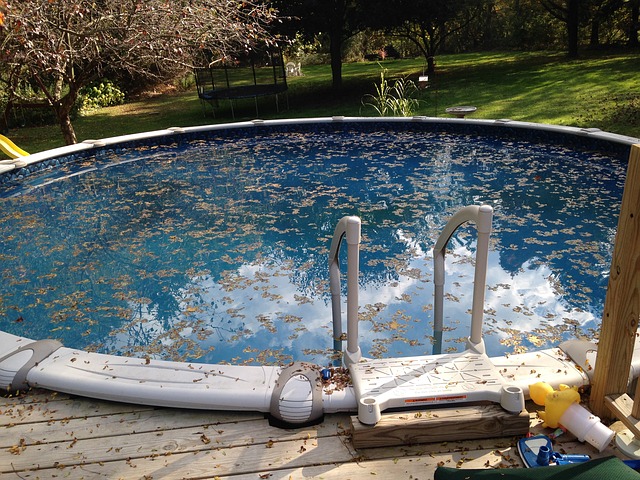


This is easily the most common cause of chlorine loss.
Why?
Because if there are any contaminants in your water, your chlorine is going to attack them. And in the process, your chlorine will get used up, which lowers your chlorine levels.
But that’s what’s supposed to happen, at least at a gradual rate. If it’s happening really fast, then it’s time to check the water
A pile of leaves at the bottom of the pool soaks up your chlorine the same way bodily oils from swimmers do. Point being, all contaminants, both the ones you can and can’t see have a major effect on your chlorine levels.
Here are a few common contaminants that cause chlorine loss in swimming pools:
- Rainwater
- Affects your pool’s pH, which controls chlorine effectiveness
- Leaves, twigs, branches, and other organic matter
- Introduce loads of contaminants into your pool, which causes chlorine to deplete faster
- Suntan lotion, soaps, shampoos, hair products (inorganics)
- Chemical contaminants that mess with your pool’s water balance
To prevent contaminant-related pool chlorine loss:
- Skim the water to remove any floating debris
- Brush the pool walls, stairs, and behind the ladders to remove buildup
- Vacuum the pool floor for a clean finish
- Use your pool water test kit to test your chlorine levels. Write down the results
- Shock the pool
- Leave your pump running, and wait 4-8 hours
- Test the water again and adjust chlorine level as needed
- Do all of this at least twice a week to keep your pool clean
Related: 7 Secrets For Keeping Your Swimming Pool Crystal Clear
UV rays from sunlight
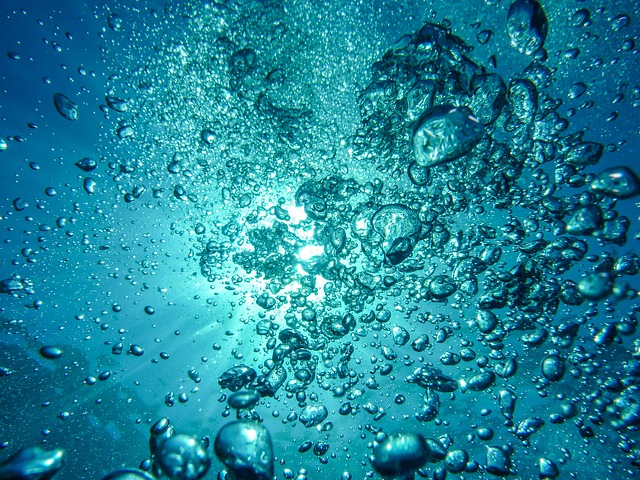


Chlorine and sunlight do not get along. This is a fact.
In short, the UV rays produced by the sun have a major effect on chlorine. When exposed to UV rays, chlorine ions begin to separate, which eventually destroys them. And as your chlorine burns away, your sanitizer level drops.
This is the very reason why CYA (cyanuric acid), or chlorine stabilizer, exists. It’s a chemical added to chlorine that keeps it active longer, and shields against harmful UV rays.
But with or without CYA, the sun still takes a toll on your chlorine levels. Fortunately, the best way to prevent that is by shielding your entire pool from the sun itself.
How?
By using a solar cover.
A solar cover acts as a barrier between your water and outside, reducing the exposure your chlorine gets to the sun. In doing this, the cover also helps to improve your pool’s heat retention while reducing water loss.
TIP: The more opaque the color of your solar cover is, the better the UV protection.
Pool water evaporation from heat
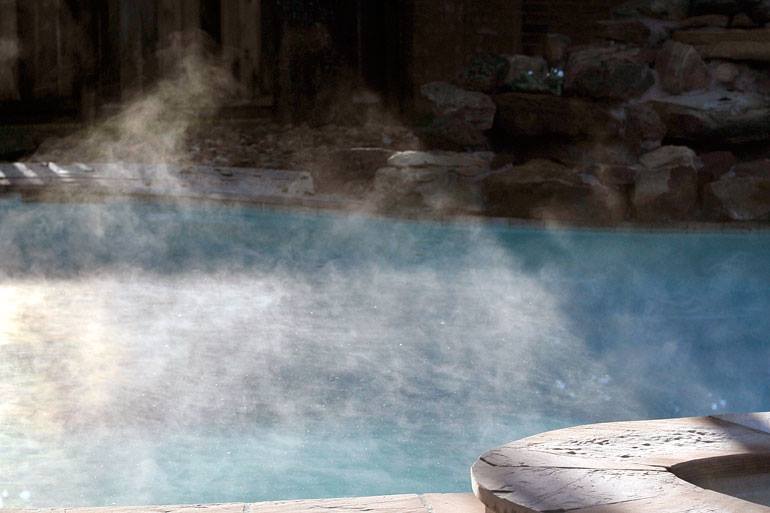


Even if the sun is nowhere to be found, hot weather is enough to mess with your chlorine.
But how could that be? If the sun isn’t out, then shouldn’t your chlorine work just fine?
Not exactly. When solar rays aren’t messing with your chlorine, the sun’s heat stays busy by evaporating water out of your pool.
And naturally, with any pool water loss comes chemical loss.
Luckily, the solution here once again is simple: use a cover.
Just like covering a boiling pot of rice to retain heat and moisture, covering your pool helps keep it warm and full.
High CYA levels causing chlorine lock
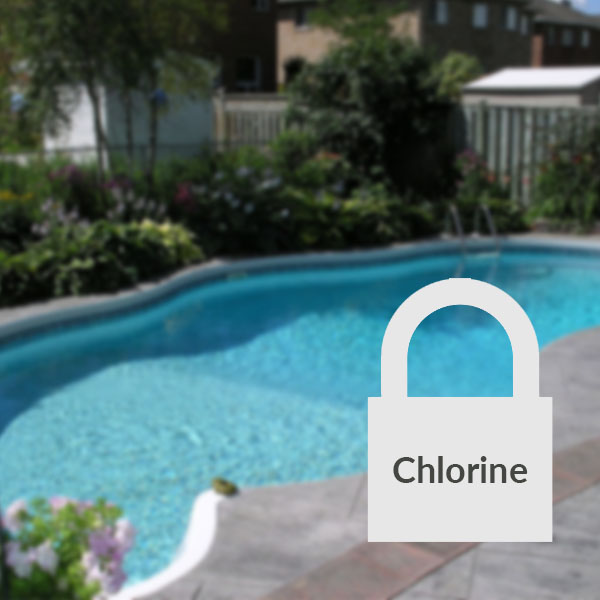


So we were just mentioning how great CYA is for protecting your pool’s chlorine from UV rays.
But now, we’re going to have to turn around and tell you that too much of it is actually bad for your pool.
Here’s why:
While CYA protects chlorine from UV damage, it also reduces it’s sanitizing ability. Chlorine’s ability to sanitize your water is known as it’s oxidation-reduction potential (ORP). And it’s scientifically proven that CYA reduces chlorine’s ORP in proportion to concentration.
So the higher your CYA levels are, the less effective your chlorine acts. And when CYA gets too high, your chlorine levels can lock up completely. (Luckily, there’s a fix for that)
To avoid high CYA levels that drain chlorine, read this post: Understanding CYA & How It Affects Chlorine
Pool parties or large swimmer loads
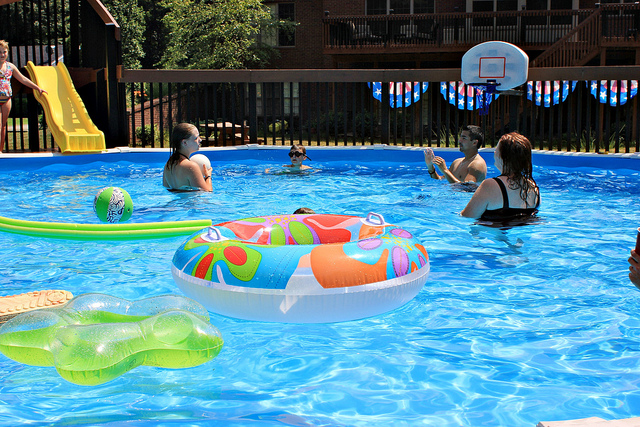


Did you have a pool party recently? Or maybe you let a lot of people swim in your pool?
If so, it could be the cause of your chlorine loss.
While you may be used to your pool’s normal rate of chlorine loss when it’s just you and your family, things get different when more swimmers are involved.
Think about it:
Imagine if suddenly, your family was twice as big. Yet you were all still swimming in the same pool and made no changes to your maintenance habits.
With twice the amount of contaminants in the water, your chlorine would get used up much faster.
So to play it safe and keep your chlorine levels in check, always shock your pool after any major swimming event or party.
Related: 40 Swimming Pool Games You Have To Play
Unbalanced pool water
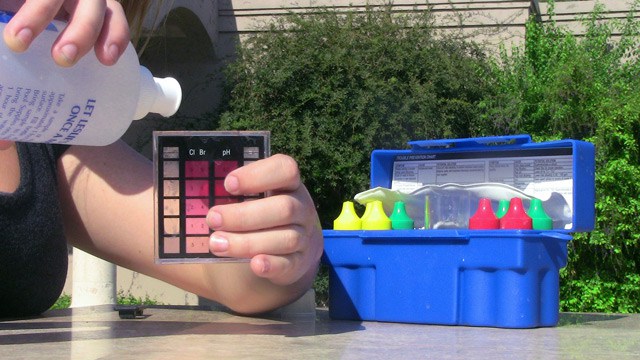


While sanitizer is definitely an important chemical in your pool water, it’s not the only one worth your attention.
For the best swims and the lowest chemical use, keeping your pool balanced is the best decision you can make. It’s a small commitment that only requires a few minutes each week. But it pays off with lower swimming pool bills and MUCH cleaner water.
Since each chemical in your water affects the other, it’s important to properly balance them.
To balance your pool water, adjust these chemicals from first to last:
- Total Alkalinity
- Ideal range: 80 – 120 ppm
- pH
- Ideal range: 7.4 – 7.6
- Calcium Hardness
- Ideal range: 200 – 400 ppm
- Chlorine (Free Chlorine)
- Ideal range: 3 ppm
- Total Dissolved Solids
- Ideal range: Less than 2,000 ppm
Test the water about an hour after you finish to make any needed adjustments.
Related: Balance Your Swimming Pool Water in 7 Easy Steps

